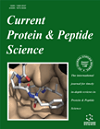-
s An Overview of the Deubiquitinase USP53: A Promising Diagnostic Marker and Therapeutic Target
- Source: Current Protein and Peptide Science, Volume 25, Issue 9, Nov 2024, p. 708 - 718
-
- 01 Nov 2024
Abstract
Ubiquitination and deubiquitination are important mechanisms to maintain normal physiological activities, and their disorders or imbalances can lead to various diseases. As a subgroup of deubiquitinases (DUBs), the ubiquitin-specific peptidase (USP) family is closely related to many biological processes. USP53, one of the family members, is widely expressed in human tissues and participates in a variety of life activities, such as cell apoptosis, nerve transmission, and bone remodeling. Mutations in the USP53 gene can cause cholestasis and deafness and may also be a potential cause of schizophrenia. Knockout of USP53 can alleviate neuropathic pain induced by chronic constriction injury. Loss of USP53 up-regulates RANKL expression, promotes the cytogenesis and functional activity of osteoclasts, and triggers osteodestructive diseases. USP53 plays a tumor-suppressive role in lung cancer, renal clear cell carcinoma, colorectal cancer, liver cancer, and esophageal cancer but reduces the radiosensitivity of cervical cancer and esophageal cancer to induce radioresistance. Through the in-depth combination of literature and bioinformatics, this review suggested that USP53 may be a good potential biomarker or therapeutic target for diseases.


